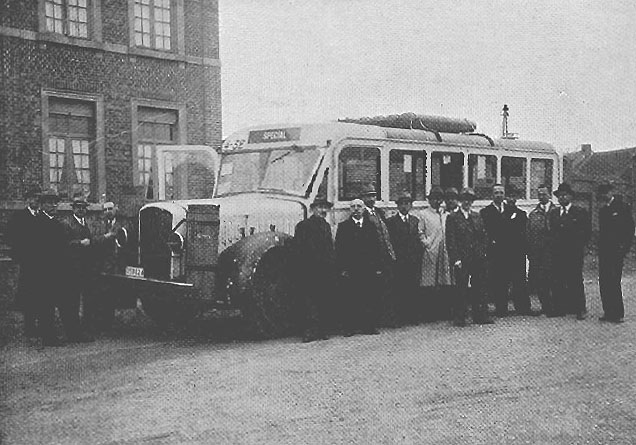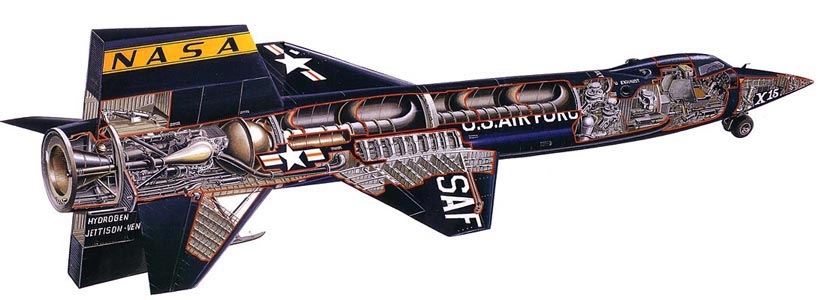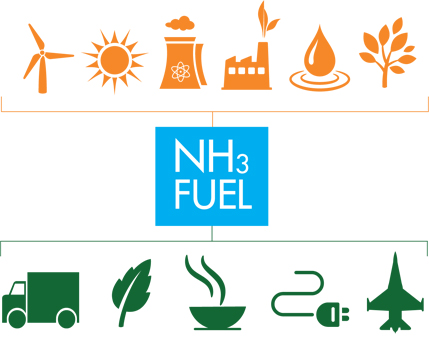
NH3 Fuel Bus, Belgium
A Brief History
1940 —
An early utilization of liquid NH3 as a fuel for motor-buses took place in Belgium during 1943. Emeric Kroch developed these ammonia / coal gas hybrid motors to keep public transportation in operation despite the extreme diesel shortages of World War II. This motor-bus fleet logged tens of thousands of miles (and there’s anecdotal evidence that some individuals used the ammonia pumps built for the bus fleet to fuel their personal cars during this period).

NH3 Fuel, X-15
1960 —
The X-15 rocket plane set speed and altitude records in the 1960s, powered by NH3.

NH3 Fuel Truck, USA
2000 —
In the summer of 2007 , this NH3 vehicle drove across America, from Detroit to San Francisco, powered by a mix of ammonia and gasoline.
Practical Today
NH3 is everywhere: huge amounts are shipped, piped, and stored in every industrial country around the world. As a fuel, NH3 has been proven to work efficiently in a range of engine types, including internal combustion engines, combustion turbines, and direct ammonia fuel cells. Due to its high energy density and an extensive, existing NH3 delivery infrastructure, NH3 is ready for the market today as an alternative to gasoline.
New Jobs
Practical alternative energy solutions are also economic solutions. NH3 will be produced by a number of manufacturing methods — which will require new research, new technology, and new jobs.
Safe and Sustainable
With over 75 years of proven safety record, NH3 will solve our future energy needs without creating danger. When NH3 is used in engines zero carbon emissions are created. A widening range of NH3 production methods will reduce our reliance on petroleum imports, and help ensure us a brighter future.
The Stick

NH3 Fuel Chart
The search for the “ideal” alternative fuel to eliminate US addiction to imported petroleum has been a long, difficult trek. The ominous impacts of the 1973 OPEC oil embargo and subsequent oil price shocks brought to light a very “unfortunate truth,” that the fate of the US economy and our very way of life is dictated by our long-standing addiction to imported petroleum. Largely due to our disproportionate share of consumption of petroleum supplies, the US is far more negatively impacted by petroleum supply disruptions and price increases than any other nation in the world. Although every President since Richard Nixon has identified US dependence on imported petroleum a matter of national priority, we now import a higher percentage of petroleum than we did in 1974. Failure to effectively act on this issue may prove to be the most devastating public policy failure in the history of the US. Finding a viable substitute to the staggering amount of imported petroleum used in the US each year will determine the ultimate fate of our country.
As we have seen in the recent past, the tenuous supply chain associated with imported petroleum is easily disrupted by natural disasters (hurricanes, earthquakes, floods, etc.), terrorism, technical failures (BP spill), wars, and even the political whims of unstable regimes. Peak oil, though still a highly debated topic in terms of timing, adds another area of uncertainty and risk for countries dependent on imported petroleum. Even without these disruptive, doomsday scenarios, simple supply/demand economics should make one wary of excessive dependence on imported petroleum due to one sobering statistic; in 2009 China displaced the US as the world’s largest automobile market. The sales of vehicles in China jumped 45 percent from 2008 to 2009 and vehicle sales are expected to increase another 25 percent to 17 million units in 2010. Failure to understand or acknowledge the obvious implications relative to petroleum demand and price, due to this huge new demand for petroleum, could prove costly.
The Carrot
On a more positive note, producing transportation fuels domestically to replace imported petroleum would produce positive, transformational benefits for the US. The huge drain on our economy associated with imported petroleum, an outflow of nearly $400 billion annually, would be eliminated. Hundreds of thousands of new jobs would be created, jobs that would remain in the US for at least the next seventy-five years. National security would be vastly improved as the risks associated with the uncertain supply of imported petroleum are eliminated. US military involvement in certain regions of the world may be altered, as it may be argued that at least a part of the reason we are involved militarily in the Mid-East is related to US petroleum interests. In summary, ending US addiction to imported petroleum would result in a vibrant US economy, dramatically improve our balance of trade, significantly improve our national security, decrease the potential for world conflict over petroleum supplies (saving the lives of US soldiers should be of paramount importance) and provide the opportunity to decrease the negative impacts of petroleum on the environment.

